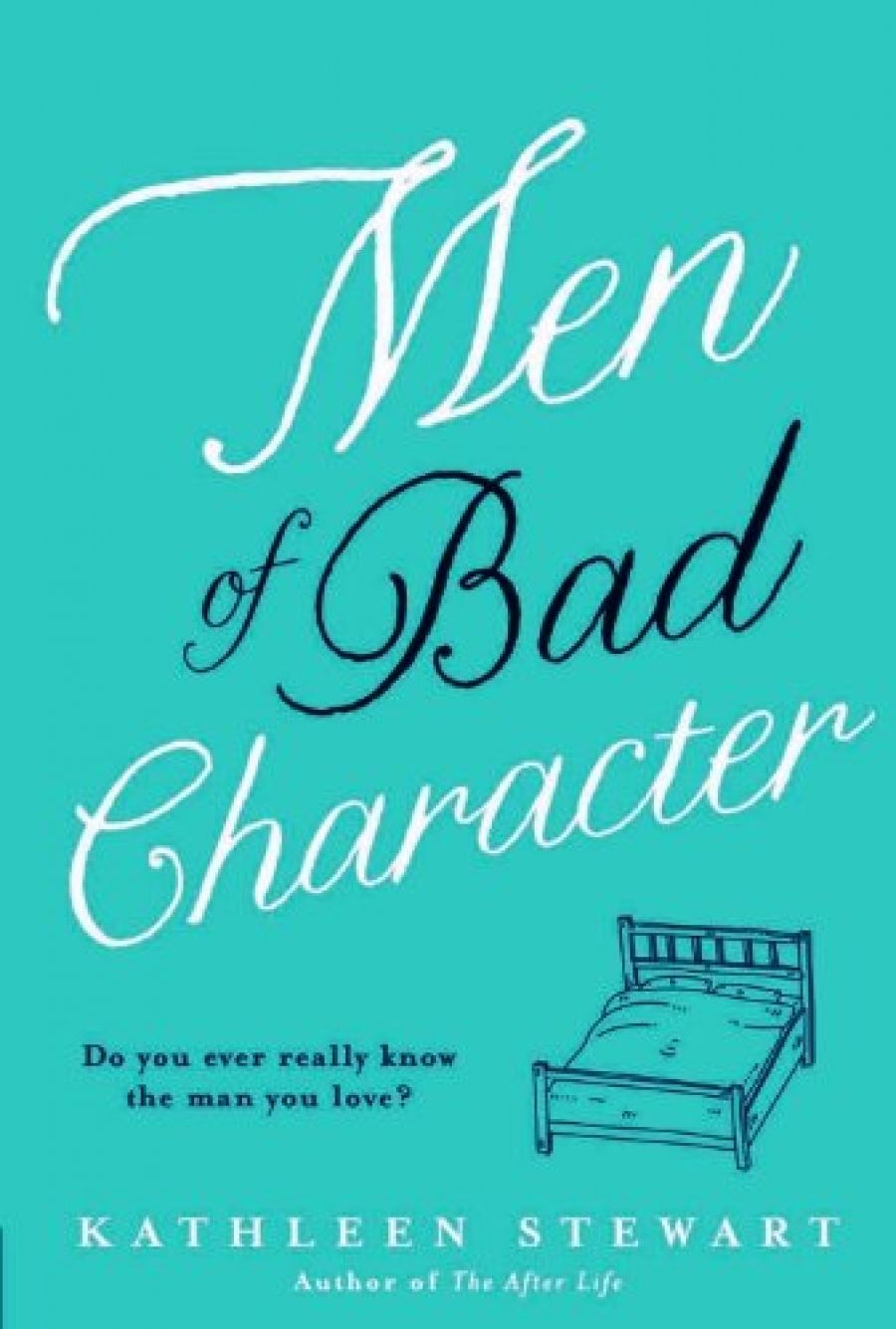
- Free Article: No
- Contents Category: Fiction
- Review Article: Yes
- Article Title: Mysteries of the bathroom
- Online Only: No
- Custom Highlight Text:
When Rose, the narrator of Kathleen Stewart’s Men of Bad Character, first visits the bathroom of Gary Gravelly, ‘there in the toilet bowl, frayed around the edges and so long languishing that it had stained the water, was the most enormous rope of turd. That, I said to myself, is the death of romance.’ Rose soon forgets, overwhelmed by the boyish charm of her new lover, but the reader is left with an indelible image. Whatever Rose might think of Gary at any stage – and she changes her opinion many times over the next couple of years – we continue to associate that repulsive image with him. This is not just a bit of earthy bad taste designed to shock. It is a bold and nauseatingly effective way of influencing the reader’s attitude to Gary.
- Book 1 Title: Men Of Bad Character
- Book 1 Biblio: University of Queensland Press, $32.95 pb, 320 pp
Gary is unsuitable – no surprise there. The title has done its work, though the details are slow in emerging. Rose senses it, and is constantly gripped with indefinable anxiety, which is transmitted very effectively to the reader. But she is caught. ‘Soon I was nothing but longing, and anxious waiting, sniffing the air, scanning the horizon, impatient at traffic lights, lifting the receiver to see if the phone was dead.’ Her prevarications are charted meticulously. As a narrator, Rose is perspicacious and ironically aware of her own failings. Early on, ‘I did not feel the need to hide who I was with him, unless you counted trying to disguise my fear of him.’ As things start to go wrong, and she feels ‘a creeping river of dread under everything’, friends give her bracing advice. She takes note, and, with mordant humour, these passages end ‘… and for a moment it all made sense’.
Rose is not only tough on herself. She finds it hard to maintain friendships after David’s arrest, because of the hurtful things people say, the ridiculous assumptions they make. After a particularly exasperating conversation with an acquaintance, she realises that ‘People will go to great lengths to console themselves, to make the world feel safe, and when that illusion is shattered it feels better to pull away from it and blame someone, and lock all the badness in one place; that’s what jails are for, so that we can overlook the fact that we are just mad apes who shop.’
Rose, though she doesn’t have much money, does like to shop, particularly for bed linen. Pale green sheets provide some consolation for David’s shocking removal from her life. As the novel ends, she is setting off to buy pillow cases: refreshing the bed, cleansing it of the men of bad character. The symbolism sits in its place, unobtrusive but intriguing. Names are clearly significant: Rose is married to David Flower; but perhaps her affinity is actually with Pinky, her boss. Meanwhile, Fleur is helping her with her besetting anxieties about her marriage to Flower and with her guilty feelings of unintentional complicity in his horrible crime of deflowering a young girl.
The reason Rose is so poor is that she works part-time for a publisher. Pinky is an endearing eccentric, always suggesting that Rose leave early and not strain herself with too much work. It is a mildly hilarious and rather disturbing picture of the publishing industry: she is paid (though not much) to give her opinion on manuscripts which she can hardly be bothered reading. Though the firm won’t publish it, Pinky is the only one who understands Rose’s poetry; her first book, years before, was a minor sensation, and she wins a prize for a new poem. She apologises for the impracticality of her ‘pastime’, but Pinky fixes her with a keen stare: ‘For a moment it glittered there, suspended in the satiny depths of his eyes – all that poetry had once meant to me.’ Suddenly, she is no longer so alone. It is a glimmer of hope, perhaps, where she has not thought to look before.
Men of Bad Character is not just a clever psychological thriller or a book-length whinge about badly behaved men and the pain they inflict on long-suffering women. Unsettling, compelling and illuminating, Men of Bad Character is a novel about changing perceptions, about what happens when instincts are suppressed, and about how we deceive ourselves.


Comments powered by CComment